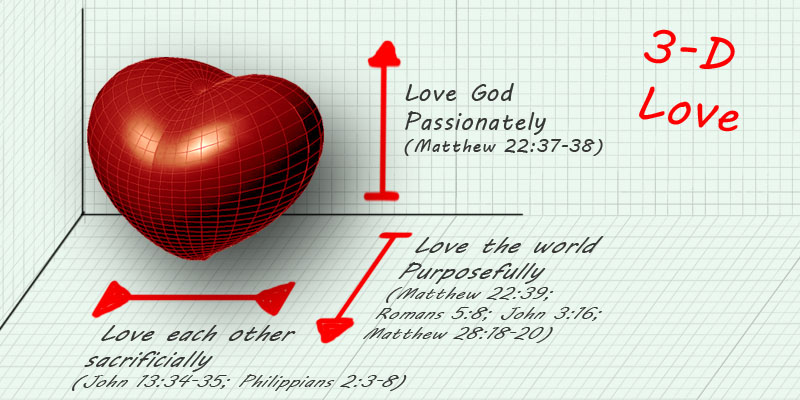3-D love is how I understand God’s purpose for believers. It is rooted in the three love commands given by Jesus. The first two are found in Matthew 22:37-39 (not exclusively, as they are, in fact, peppered throughout the Old and New Testament as well). When asked to name the greatest commandment, Jesus quotes Deuteronomy and says, “‘YOU SHALL LOVE THE LORD YOUR GOD WITH ALL YOUR HEART, AND WITH ALL YOUR SOUL, AND WITH ALL YOUR MIND.’ This is the great and foremost commandment. The second is like it, ‘YOU SHALL LOVE YOUR NEIGHBOR AS YOURSELF.‘” He says that all of the Law and the Prophets (basically the whole of the Old Testament teachings) are summed up in those two commands.
Those commands are relayed in my statements “Love God Passionately” and “Love the World Purposefully.” A passionate love for God demands every attention that I can give it. It is not just an emotional fondness, but instead a consuming drive that should affect every thought and action. In fact, Jesus says in John 14:21 that our obedience to Him is the marker of our love. 1 Corinthians 13 makes it clear that love is not about emotion, but is about attitude and action.
Loving our neighbor as our self is, likewise, not about emotion. It is about seeking the best for those we are able to affect. “Love the world purposefully” reflects the desire to be intentional about loving those around us. Instead of merely reacting or waiting for opportunities, we can consider and seek out how best to serve those we can help, regardless of compensation, appreciation, or cost. In addition to meeting physical needs, our greatest help lies in the spiritual realm. Loving others with purpose recognizes that “…God so loved the world that He gave His only begotten Son, that whosoever believes in Him should not perish, but have everlasting life.”
And finally, we are to “love each other sacrificially.” Jesus told his disciples in John 13:34-35, “A new commandment I give you, that you love one another. Even as I have loved you, that you also love one another. By this all men will know that you are my disciples, if you have love for one another.” Believers are to be known – to be disctinctive – by their love for one another. It is both extreme, following the example of Christ, and it is reciprocal. How has Christ loved us? He humbled Himself, sacrificing Himself on the cross for us. As Philippians 2:3-9 puts it – Christ was in His very nature God, but he allowed Himself to be despised and degraded on the cross for our sakes. This is the nature of the love we should have for one another – seeking the other’s interests above our own.
How do these purposes compare to the commonly held purposes of the church and believer – worship, discipleship, fellowship, ministry, and evangelism? They encapsulate these five purposes. A love for God is reflected foremost in our worship – our complete recognition and submission to His Lordship. Discipleship, likewise, is an act of love for God and love for one another. We study God’s Word and seek to obey it, and we lead our fellow believers to do the same, because we love God and because we love them. Fellowship is best reflected not in social events but in sacrificial love, service and compassionate concern, for one another. Ministry is the acting out of love, whether for other believers or for the world outside the church. And, as stated above, the greatest love we can show the world is through evangelism.
I also prefer the three loves to the five purposes because I think they are easier to remember, easier to act on, clearer to understand, and are both pervasive and clearly stated in the Bible.
What are your thoughts on the three love commands as a basic foundation for a purpose-filled life and church?




Awesomely put! Loved it so much, I pinned it to Pinterest.com.
God bless you continually!